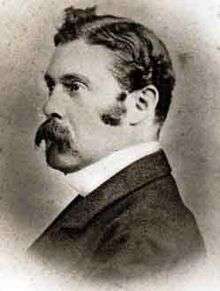Alexis de Castillon

Alexis de Castillon (born Marie-Alexis de Castillon de Saint-Victor) (13 December 1838, in Chartres – 5 March 1873, in Paris) was a French composer of classical music.
Life and career
Son of an old family of the Languedoc nobility, and initially intended by his parents for a military career, Castillon gave up plans for professional soldiering in favor of music, which he learned first in his birthplace and then in Paris, studying piano and composition. In this second capacity he went to the Paris Conservatoire; there he attended the class of Victor Massé and later, from 1869, that of the more distinguished César Franck. Even before he came under Franck's aegis he composed his Opus 1, a piano quintet, probably inspired by the earlier example of his friend Camille Saint-Saëns.[1] Both the quintet and the later piano quartet op. 7 follow Schumann's model.[2] He disavowed earlier efforts, including a symphony in F major which he had written in 1865.
In fragile health at the best of times (volunteering during the War of 1870, he fell ill and was demobilized in 1871), he died of complications from fever in 1873, before even reaching the age of 35. He nevertheless had time to compose several impressively Romantic works. These include pieces for piano, chamber music, mélodies, a piano concerto, and Symphonic Sketches. As well as writing music, he took part in Parisian musical life, in particular helping to create, in 1871, the Société Nationale de Musique of which he was the first secretary.
Selected compositions
- For piano
- Fugues dans le style libre, op. 2[3]
- Suites: op. 5, op. 10[4]
- Cinq pièces dans le style ancien, op. 9 (1871)
- Six Valses humoristiques, op. 11 (pub. 1872) (orchestrated later by Charles Koechlin.)[4]
- Chamber music
- Piano quintet in E♭,[5] op. 1 (1863–64)[6]
- String quartet in A minor, op. 3 (ded. to Henri Poencet) (by 1867)
- String quartet no. 2 (only Cavatina published) in F minor (would have been op. 3, no. 2) (by 1867)
- Piano trios no. 1 op. 4 in B♭ (1865), no. 2 op. 17 in D minor (1879)[7][8]
- Sonata for violin and piano in C major (1868), op. 6
- Piano quartet in G minor op. 7 (1869)[9]
- Works with orchestra
- Songs
- Six poèmes d'Armand Sylvestre op. 8 (1868–73)[11]
References
Notes
- ↑ Fauquet (1997), p. 304
- ↑ Fauquet (1997), p. 302
- ↑ OCLC 37008839.
- 1 2 3 Warszawski, 2005.
- ↑ "Elibron republication of Piano Quintet". Paris: Flaxland. 1867. OCLC 228493431. Archived from the original on 10 July 2011. Retrieved 10 February 2009. .
- ↑ Fauquet (1997), p. 302.
- ↑ OCLC 17166404.
- ↑ Duchesneau (1997), L'avant-garde musicale et ses sociétés à Paris de 1871 à 1939 at Google Books, Editions Mardaga. p. 18. ISBN 2-87009-634-8.
- ↑ "Review of Recording of Castillon, Saint-Saëns, Lekeu, Chausson Piano Quartets". March 2005. Archived from the original on 8 January 2009. Retrieved 31 December 2008.
- ↑ OCLC 301431358
- ↑ OCLC 153885807.
Sources
- Fauquet, Joël-Marie (1997). "Chamber Music in France from Luigi Cherubini to Claude Debussy". In Hefling, Stephen E. Nineteenth-Century Chamber Music. New York. pp. 287–314.
- Warszawski, Jean-Marc (2005). "Biographical Notice for de Castillon" (in French). Retrieved 10 February 2009.
External links
| Wikimedia Commons has media related to Alexis de Castillon. |
- "Biography of Alexis de Castillon" (in French). Retrieved 31 December 2008.
- Free scores by Alexis de Castillon at the International Music Score Library Project (IMSLP)